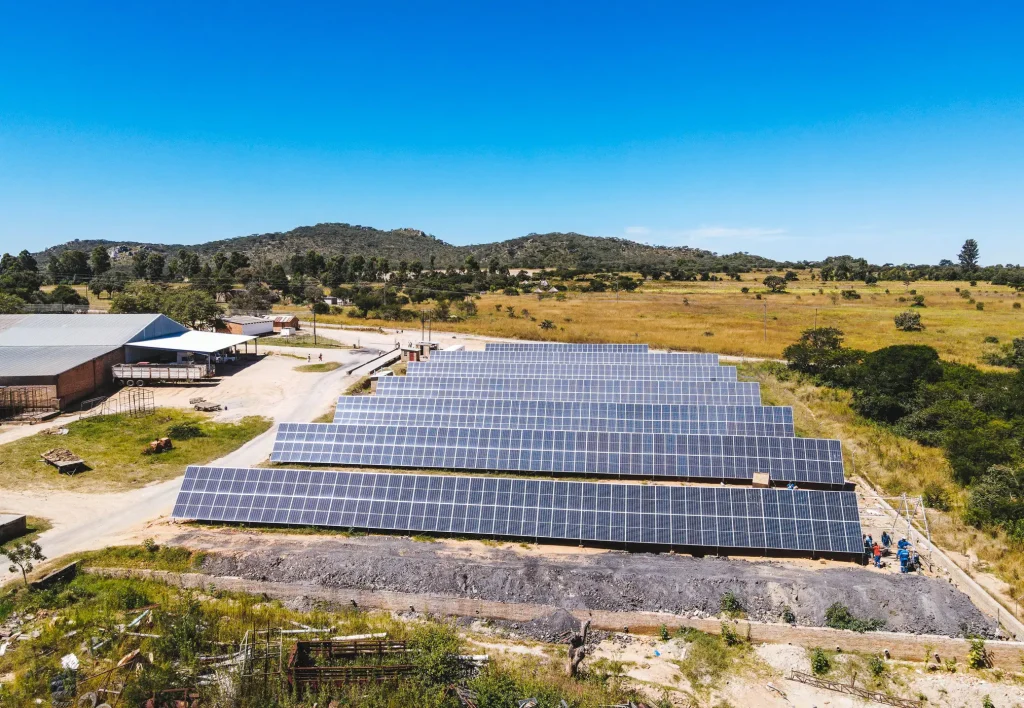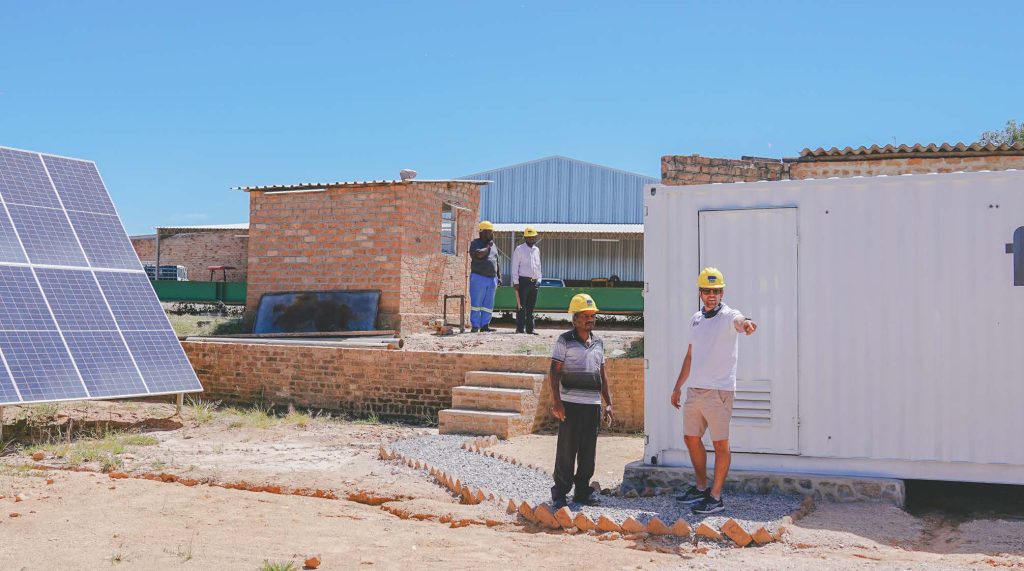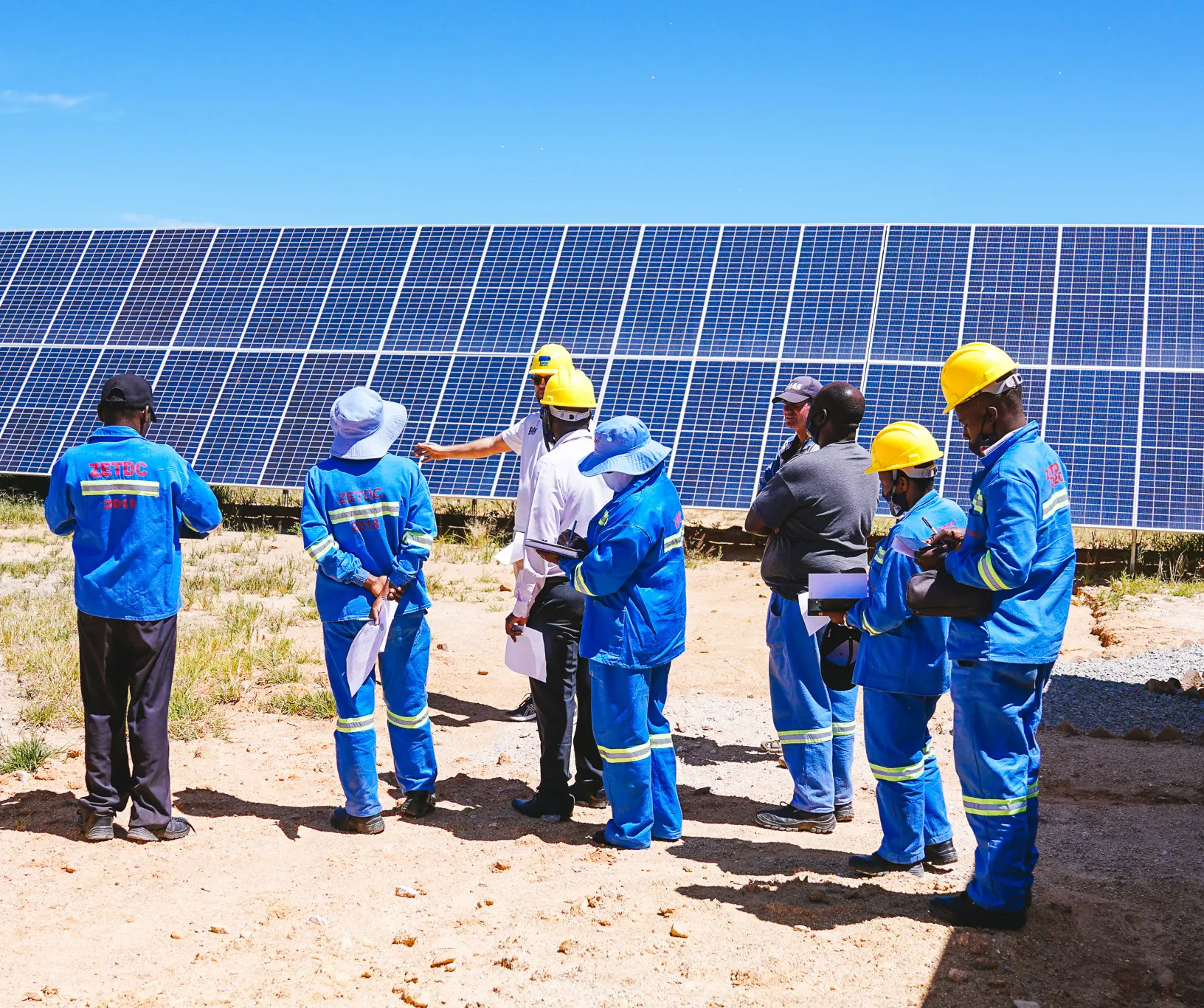Established in 2009, Solar Energy Projects (SEP), has been setting the standard in solar projects and renewable energy production around Southern Africa, and mainly in Zimbabwe. It has become a fast-growing leader in renewable energy services and solar power provision. Solar Energy Projects specializes in large agricultural, industrial, commercial, and domestic solar solutions. With a wealth of in-house experience and expertise, and supported by world-class technology partners, it has become one of Zimbabwe’s only contributors in complete design, engineering, procurement, and construction (EPC), making it a Turnkey EPC solution provider, with a focus on battery-based solar systems.

Solar Energy Projects is headed by the managing director, Sebastian Smyth, who is also the cofounder of Penhalonga Renewable Energy, an IPP micro-hydro developer. Sebastian Smyth embarked on his career whilst still in senior school. He began working for his father, Oloff Smyth, an Electrical Engineer with 35 years of experience in heavy and light electrical engineering in Zimbabwe, doing inverter repairs and installations. He endeavored to continue his studies in Electrotechnology in Renewable Energy at TAFE in Perth, Australia. Sebastian worked in the industry on large system design and installations. After completing his studies and work experiences, Sebastian along with the help of his father Oloff, launched Solar Energy Projects (SEP), which has become one of Zimbabwe’s largest and most reputable solar companies today.
Solar Energy Projects specializes in the design, construction, and maintenance of several projects, including farms, rural schools, hotels, safari camps, factories, hospitals and clinics, and luxury homes. SEP offers back-up as well as off the grid power solutions. In Applying the very latest technology with on the ground experienced technicians, SEP ensures that each project is handled professionally, with a service standard from people who are passionate in facilitating the corridors of power, and who give real meaning to “a brighter future”.
COMMERCIAL IRRIGATION
There is an increasing need for the development of solar-powered irrigation systems in order to mitigate the disruptions caused by the sometimes unreliable grid supply. The high cost of backup diesel generators and the pressure on agricultural exporters to ‘green up’ their inputs additionally encourage alternative clean energy systems to be put into place. Commercial irrigation is just one of the many services that is offered by SEP and is supported by VSD systems.
A HYBRID SYSTEM
The Hybrid system consists of battery storage and a grid connection that can be used to power loads or replenish batteries when necessary. This makes for an economical and reliable solution Traditionally, the term hybrid referred to two generation sources such as wind and solar, but in the solar world, the term ‘hybrid’ refers to a system which uses an inverter that makes use of combined solar power and batteries with the interaction of the electricity grid. The hybrid system is connected to the electricity grid and can use the grid power to supplement the power generated by solar panels or the battery bank. The main components in the system consist of solar panels, a charge controller, hybrid inverter, and batteries. The system utilizes a battery-based hybrid inverter which can either extract electrical power from its battery bank, or from the utility grid to power loads. Depending on the time-of-day electricity is used, the solar system can produce excess energy after filling up its batteries. Instead of this excess power not being made use of as would be the case in an off-grid system, once the batteries are full, power can be exported to the electricity grid, and can then be compensated for through an energy policy called Net Metering.
WHAT IS NET METERING
Grid-tying to The Zimbabwe Electricity Distribution Company’s (ZETDC) has recently invited all stakeholders producing solar energy to participate in their Net Metering Programme. Net metering is an electric billing tool that uses the electricity grid to utilize excess energy produced by solar power systems. With net metering, the excess energy which solar panels produce is redirected into the national grid, which is then credited to the account. When needing to make use of power from the electricity grid, usage will be billed according to the credits accumulated. These credited units will reduce the monthly Zimbabwe Electricity Supply Authority (ZESA) bill thus making it more cost-effective.
In 2019, SEP in conjunction with ZETDC successfully installed the first net meters in Zimbabwe. As more Zimbabweans begin to feed into the grid, its capacity will increase and eventually load shedding will decline. This is a national cause and one can make a difference for a better Zimbabwe. Successful applicants will be able to feed their excess power to the national grid in exchange for power units.

Due to the seasonal differences in solar production, Net Metering also helps by allowing users to utilize the credits accumulated on the national grid at a later date. In essence, Net Metering can be perceived as having the national grid serve as a giant solar battery that can be charged with excess power, while running the electric meter in reverse.
Advantages of Hybrid Solar Systems and Net Metering
Some of the advantages of hybrid solar systems and net metering include:
- Reduced grid dependency allows for efficiency as well as has environmental and financial benefits. An off-grid system entails functionality despite a main grid power failure.
- Hybrid inverters come with backup power capacity thus providing uninterrupted power supply. It allows consumers to draw power from the grid, battery or solar.
- It enables self-provision of energy using solar panels and battery backup, with the added safety-net of being connected to the electricity grid.
- Provides control over electricity bills by reducing electricity bills when excess power is fed to the grid and reduces the electricity bills.
- Most systems currently discharge their batteries and recharge them the next day. This is referred to as a cycle. Cycling batteries depletes the battery life faster. With a net meter, excess power is sent to the grid during the day and utilized at night, instead of stored battery power, which is reserved for emergencies. You can double or triple battery life due to reduced cycling with a net meter.
A hybrid solar system combines the best of both worlds’, i.e., off-grid and on-grid systems. It allows the convenience of a grid connected system with savings from Net Metering, with the peace of mind of a battery backup. With Solar Energy Project’s installed hybrid solar systems, there will never be a shortage of power. Hybrid systems provide the perfect solution for flexible, and affordable energy supply in remote areas. With SEP’s correctly designed systems, equipped with battery capacities which meet energy requirements and demand, power supply is guaranteed throughout the year.
SEP offers systems which allow flexibility from complete reliance on the main power grid, and additionally assist in avoiding the spiraling diesel generation costs for remote homes. SEP offers an ideal solar solution for every situation. Project implementation includes:
- Customization design and supply of systems
- All equipment is pre-assembled and tested.
- SEP install equipment, according to design specifications, reducing time on-site and overheads.
- Simple and reliable support and maintenance by SEP
Pre-assembled off-grid solar solution kits, allow customers an overview of all of the premium components used with explanations to assist with off-grid solar system planning. With the absence of or inconsistent power in some locations, SEP offers sustainable alternative solar solutions.
A prime case of an effective hybrid system using Net Metering, is the one belonging to Mike Vanduren, which was designed and installed by SEP in Headlands, Zimbabwe. SEP designed a unique 500 Kwp East-West facing array, with 460 Kwh lithium battery storage and a 250 Kw hybrid inverter. Even with power supply suddenly being cut-off from the main grid, there is no noticeable flicker of lights or loss of power as would be expected. This alternative solar solution provides 250 Kw of power being fed back into the grid. Mike Vanduren reveals in a testimonial of how well the hybrid system worked during a 42 hour power cut, whereby he only needed to make use of his generator for 6 hours in total out of the 42 hours:
“As a farmer, you see things on paper but you always a bit weary of how it’s going to work in practice, and I must admit, this looks as though it is far better than what we thought it was going to be.
Mike Vanduren, Zimbabwe
Other testimonials from additional projects include the following:
“The project was installed by Solar Energy Projects, a very competent team. We really enjoyed working with them, and so far, it’s been absolutely hassle free. It’s made our operation incredibly convenient and efficient. We very happy with the saving in that regard. The project’s worked out better than our expectation. Any problem we do have, we just phone Solar Energy Projects and they send a team out to tend to it almost immediately.”
Graham Ross, Headlands Zimbabwe
“Cost-wise it makes a lot of sense. Very happy with the system. We’ve had zero maintenance issues here.” Mark Stubs, Headlands Zimbabwe.
Solar Energy Projects are very conscious about where supplies are sourced, and only work with reputable companies that follow ISO standards. SEP systems are designed to last with automated safety features and a full back-up service in the unlikely case of any problems arising. They offer full training courses for their power station systems as well as, commercial, farming, school, and hospital solar systems. Solar Energy Projects are official distributors for several renowned solar brands such as Freedom Won, Victron Energy, SunSynk, Jinko, BSLBatt and Dynamic solar VSDs. Solar Energy Projects continues to be the clean energy company of choice, with its world class background and power of experience.
Text by Solar Energy Projects
Images supplied by Solar Energy Projects

